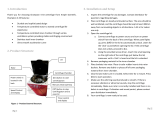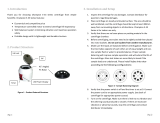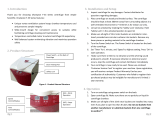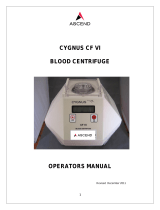
Roche Diagnostics
Operator’s Manual · Version 1.1 19
cobas® 8100 automated workflow series 1 General safety information
Safety summary
Biohazardous materials
WARNING
Infection by samples and associated materials
Contact with samples containing material of human origin can result in infection. All
materials and mechanical components associated with samples of human origin are
potentially biohazardous.
r Follow Good Laboratory Practices, especially when working with biohazardous
material.
r Keep the top covers and the front doors and drawers closed while the system is
operating.
r Always switch the system to the correct operating mode, as given in the appropriate
procedure, before working with an opened cover, door, or drawer, for example,
cleaning or maintenance.
r Be sure to wear appropriate protective equipment, including, but not limited to, eye
protection with side shields, fluid resistant lab coat, and disposable laboratory gloves.
r Wear a face shield if there is a chance of splash or splatter.
r If any biohazardous material is spilled, wipe it up immediately and apply disinfectant.
r If any sample comes into contact with your skin, wash it off immediately with soap and
water and apply a disinfectant. Consult a physician.
WARNING
Biohazardous materials
All in vitro diagnostic equipment, pretreatment systems and patients samples used on this
system should be treated as potentially biohazardous materials.
r Use the personal protective equipment recommended by your facility when handling
any of these components.
r If any potentially biohazardous materials come into direct contact with your skin, wash
them off immediately and apply disinfectant. Consult a physician.
r It is possible to pierce through protective gloves. Therefore use extra caution when
working inside the instrument.
WARNING
Samples
r Avoid direct contact with samples that may be biohazardous.
r If sample spills on the instrument, wear protective clothing including, but not limited to,
a lab coat, disposable laboratory gloves, and eye protection, and wipe it up
immediately.
r Make sure that the samples do not contain clots, dust or other insoluble contaminants.
If insoluble contaminants are contained in a sample, correct measuring values may not
be obtained.
WARNING
Restopper caps
The following instructions apply to all restopper caps, including Archive caps.
r The caps are for protection from evaporation only.
r The caps are not guaranteed to be leakproof.
r Store capped tubes only in an upright position.
r If capped tubes fall, or are accidentally placed on their sides, remove the caps manually
before loading them onto the IPB module.
r Capped tubes should not be stored frozen.
r Do not push the caps into overfilled tubes.
r Do not push the cap into the sample liquid.
r Do not mix samples or reinsert used caps.























